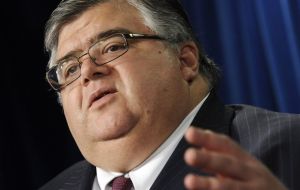MercoPress. South Atlantic News Agency
Mexico Casterns throws his hat into the IMF MD election ring
 The Mexican central bank president was deputy managing director of the IMF from 2003 to 2006
The Mexican central bank president was deputy managing director of the IMF from 2003 to 2006 Mexico central bank Governor Agustin Carstens will be presented as a candidate for managing director of the IMF, the Finance Ministry said in an e-mailed statement Sunday.
The process to choose a new leader at the IMF should be “open, transparent and based on merit,” the ministry said. Finance Minister Ernesto Cardoso will present Carstens’ candidacy on Monday, the statement said.
With Carsten’s nomination, Mexico joined Australia, China and other nations in calling for the new managing director of the multilateral organization to be chosen because of merit and not the convention that the position should go only to Europeans.
Australian Treasurer Wayne Swan said May 22 the position shouldn’t be “limited” to any one nation or continent.
The IMF plans to complete its search for a managing director by June 30. Carstens served as deputy managing director of the fund from 2003 to 2006.
Carstens became central bank governor in January 2010 after Guillermo Ortiz stepped down. Carstens, who has a doctorate in economics from the University of Chicago, served as Finance Minister starting in 2006, where he led Mexico’s response to the global financial crisis. Mexico was the first nation to request a flexible credit line from the IMF, a mechanism to help support economies seeking strong macroeconomic policies.
Mexico leads a group of eight countries with 117,045 votes, or 4.66% of the total IMF voting power, according to the multilateral lender’s website. The group is the seventh largest, measured by voting power, behind the U.S., Japan, Germany, France, the UK and 10 nations led by Belgium.
Casterns as chief economist for the central bank from 1994 to 1999, he co-wrote a paper in which he pushed for market participants to have broader access to central bank data. Under Carstens, the central bank published the minutes of policy meetings for the first time this year.
The IMF renewed and boosted Mexico’s flexible credit line to 72 billion US dollars in January, replacing the one-year 48 billion USD facility. Mexico first sought the line in 2009 to bolster confidence in the economy, which that year contracted the most since 1995. Colombia and Poland were the only other two nations to enter similar agreements, which IMF said were reserved for nations with strong economic policies.
Mexico’s economy grew 5.5% last year, the fastest growth in 10 years, and may expand as much as 5% this year, Carstens said on May 11. Policy makers boosted their forecast for growth this year without changing their forecast for inflation of 3% to 4%. Annual inflation slowed to 3.36% in April, near the 5-year low set in March and half that of Brazil. The central bank has a target of 3% inflation.




Top Comments
Disclaimer & comment rulesCommenting for this story is now closed.
If you have a Facebook account, become a fan and comment on our Facebook Page!